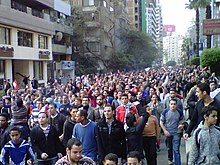Waithood

Waithood (a
The neologism was coined in 2007 by political scientist Diane Singerman.[5][6]
Waithood is applicable only to college educated people who are not compelled to settle in blue collar jobs due to support from family elders or resources. Due to the lack of any potential employment, waithood is also tangentially related to rising rate of belated parenthood in various developing countries, with younger people choosing or being forced to delay starting their own families, which was uncommon in the modern industrialized countries when they were developing.[7][8]
See also
- NEET – Demographic category of persons who are not in education, employment, or training
- Freeter – Demographic category in Japan for persons aged 15 to 34 who are not housewives or students and are unemployed or underemployed
- Twixter – Demographic category for young adults who are trapped, in a sense, between adolescence and adulthood.
- Emerging adulthood and early adulthood – Phase of life following adolescence
References
- S2CID 149870672.
- ISBN 978-90-04-26790-9. Note: This book is a collection of papers presented at the Lustrum Conference in honor of Price Claus, held in Paleis Noordeinde in The Hague on 28 November 2012.
- ^ Singerman, Diane (20 February 2008). "Thirty and Single, Coping with Delayed Marriage". Washington, DC: Middle East Youth Initiative. Archived from the original on 2008-07-05.
- ^ Dhillon, Navtej (22 May 2008), Middle East Youth Bulge: Challenge or Opportunity?, Washington, DC: The Brookings Institution, archived from the original on 2011-06-06
- ISBN 978-1-78920-900-6.
- SSRN 1087433
- ^ Middle East Youth Initiative. "Understanding Waithood". Washington, DC: Author. Archived from the original on 2008-08-20.
- ^ Silver, Hilary (September 2007), Social Exclusion: Comparative Analysis of Europe and Middle East Youth (PDF), Middle East Youth Initiative Working Paper, vol. 1, Washington, DC: Middle East Youth Initiative, archived from the original (PDF) on 6 March 2008
Further reading
- Al Yousuf, Nabil (18 January 2008). "Fountain of youth". Gulf News. Dubai: Al Nisr Publishing. Archived from the original on 18 January 2008.
- Setrakian, Lara (23 December 2007). Written at Dubai. "Young and Out of Work in the Middle East". ABCNews.com. New York City: ABC News. Retrieved 13 November 2023. Archived 1 January 2008 at the Wayback Machine
External links
Look up waithood in Wiktionary, the free dictionary.
- Ali, Mohamed (November 2013). The link between unemployment and terrorism. New York City: TED Conferences. Retrieved 13 November 2023.
